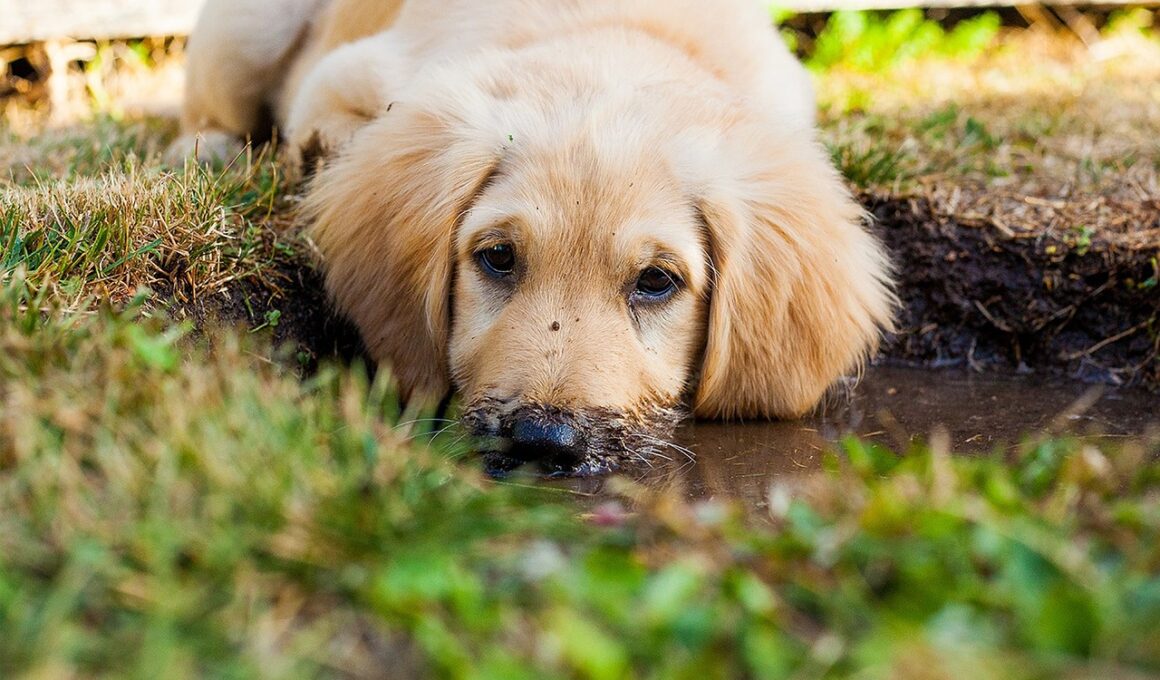Excessive Digging: When to Consult a Veterinarian or Behaviorist
Excessive digging in dogs can become a frustrating behavior problem for pet owners. Understanding the reasons behind this action is crucial in addressing it effectively. Dogs dig for various reasons, including natural instincts, boredom, or stress. If you notice your dog digging excessively, it’s essential first to observe their environment. Are they confined to a small space where they might feel anxious? Are there other stressors present? Each case is unique, and pinpointing the cause is the first step towards resolving the issue. Additionally, it’s rewarding to engage in preventive measures. Providing sufficient exercise, mental stimulation, and interactive toys can help alleviate boredom. If your dog continues to dig excessively despite these measures, it’s advisable to consult a professional. They can assess your dog’s behavior and possibly recommend strategies to minimize this habit. Furthermore, consider the impact of digging on the dog’s physical health. Excessive digging can potentially lead to injuries, so addressing this behavior is imperative not only for your garden but for your dog’s wellbeing as well. In some instances, behavioral modification techniques may be required to create healthier habits.
Seeking help from a veterinarian or a certified animal behaviorist is essential if you face constant digging challenges. A veterinarian will check for any underlying health problems that may contribute to this behavior. Conditions such as anxiety, hunger, or even certain medical issues can manifest as excessive digging. Identifying such factors early can lead to effective treatment, potentially reducing the digging behavior significantly. On the other hand, trained behaviorists possess the expertise to modify canine behavior through various techniques. Behavioral assessments can help to create personalized plans tailored to the dog’s particular needs. Additionally, they can aid in identifying triggers and providing strategies to manage your dog effectively. Owners should be prepared to invest time and patience when trying to change digging habits. Consistency in training is key, and it may take time before you see improvements. Interactive training sessions, positive reinforcement, and establishing a routine can help in redirecting your dog’s energy. Ultimately, the goal is to create a harmonious environment for both the dog and the owner, one where digging becomes less of an issue and more manageable.
Identifying Triggers for Excessive Digging
Understanding the triggers behind excessive digging is critical in addressing this canine behavior. Dogs may dig due to boredom, anxiety, or even a natural instinct to explore their surroundings. For instance, some breeds have stronger digging instincts than others, due to their original working roles. Tracking your dog’s behavior during various activities can help identify triggers. Observe when the digging occurs: Is it during specific times of the day, such as when you leave home? Or does it happen often when there are loud noises? Keeping a journal can aid in identifying patterns and possible associations leading to digging. Digging may also stem from environmental stressors, such as landscaping work, construction, or unfamiliar guests. These disruptions may induce anxiety in your pet, prompting their digging behavior. Moreover, proper training can alleviate these habits by providing the dog with alternatives to express their natural instincts. It is essential to prevent the development of negative behaviors by integrating distraction techniques. As a result, they will gain confidence while avoiding excessive digging altogether. The right approach can return your dog’s peace and minimize digging behavior effectively.
Once you have identified the potential triggers for excessive digging, it’s time to take proactive steps towards creating a positive and nurturing environment for your dog. Providing mental stimulation and physical exercise can significantly mitigate digging behavior. Engaging in daily walks, fetch games, or participation in dog sports can provide much-needed outlets for energy. Additionally, providing puzzle toys or interactive games can keep your dog’s mind engaged. These activities can help to reduce the likelihood of them resorting to digging for entertainment or relief. Implementing a consistent schedule can also help ease anxiety in dogs that dig due to being left alone. Making transitions easy and predictable will offer your dog comfort throughout the day. An organized routine enables dogs to understand their surroundings better and reduces uncertainty, which is often associated with stress-induced digging. Training sessions that incorporate commands to redirect behavior can also be beneficial. Reinforcing positive behaviors while discouraging excessive digging can promote more constructive habits over time. Remember to always stay patient and persistent. Small changes can lead to significant improvements in your dog’s behavior regarding digging.
Consulting Professionals for Help
In cases where digging becomes problematic, consulting professionals is advisable to gain insights and tailored strategies. Veterinary clinics offer specialists who can evaluate your dog’s overall health status. This assessment can determine if there are underlying medical issues causing stress or discomfort leading to excessive digging. Addressing any health concerns can significantly affect behavior and improve your dog’s well-being. Alternatively, a certified animal behaviorist can perform a behavior assessment to understand your pet’s actions better. They can develop a personalized training plan designed to redirect energy and minimize digging urges. This plan might involve specific exercises or activities that promote desired behaviors rather than digging. Additionally, it’s essential to ensure that your dog has adequate outlets for their natural instincts. Professionals can help adapt your dog’s environment to redirect their tendencies while ensuring they remain engaged and stimulated. Overall, involving experts can enhance your dog’s quality of life. It can also offer you guidance on how to provide a safe, supportive, and stimulating atmosphere. Such assistance can lead to constructive behavior changes that benefit both parties.
Owners should remember that behavioral modifications and training take time and patience to yield results. Consistency is pivotal when implementing new strategies, regardless of whether you’re working on their own or with a professional. Establishing boundaries and encouraging positive behaviors will require persistent reinforcement. Utilizing a combination of training techniques and proper environmental adjustments can lead to success. Additionally, consider integrating fun and engaging activities that appeal to your dog’s personality. Dogs thrive when they feel connected to their owners through shared experiences. Whether it’s agility training, obedience classes, or simply providing ample playtime, these factors reinforce positive interactions. Always praise and reward desired behavior as a way to motivate your dog. Moreover, providing a safe and stimulating environment reduces the need for digging as a form of stress relief. Creating a designated digging area may also help. By allowing your dog to dig in a controlled space, you can satisfy their natural digging instinct without ruining your yard. Moreover, have patience as the small changes can lead to significant benefits for both dog’s behavior and overall happiness.
Long-Term Solutions and Prevention
Addressing excessive digging behavior requires long-term strategies to ensure it does not recur in the future. Having a solid plan in place allows owners to maintain progress achieved through previous modifications. Once your dog has improved their digging behavior, it’s essential to reinforce positive habits continually. Implementing regular training sessions while maintaining a structured routine reinforces the new behaviors established during the initial training phases. Beyond training, fostering a nurturing environment reduces the likelihood of anxiety-induced digging behavior. This can involve designating specific zones where digging is allowed, along with providing engaging toys and stimulating activities. Encourage explorative behaviors in acceptable forms, allowing dogs to satisfy their natural instincts safely. Furthermore, being proactive about environmental changes ensures your dog remains calm in potentially confusing situations. Monitor how your dog perceives changes, ensuring smooth adjustments to new surroundings, noises, or visitors. Providing continued support through engaging activities and consistent interactions not only fosters bonds but maintains their emotional well-being. Ultimately, preventing excessive digging behaviors encompasses a holistic approach that combines training, emotional support, and understanding.
Choosing the right professionals to consult can be an important step in managing excessive digging in dogs. Research local veterinarians and animal behaviorists, examining their qualifications and experience. Look for those who have expertise in canine behavior issues or specialize in training. Reading reviews or asking for recommendations from fellow dog owners can help ensure that you find a suitable professional. Before scheduling an appointment, prepare a list of questions and concerns regarding your dog’s behavior. This preparation can enable you to gain the most effective information during your visit. Additionally, following up on recommendations and implementing individualized strategies discussed can lead to faster results. Remember, every dog is unique, and what works for one may not work for another. Therefore, patience and flexibility are critical during this process. Maintaining open communication with selected professionals helps diagnose issues accurately, allowing for tailored solutions that suit your dog’s needs. Celebrate any progress made, regardless of how small, as it reinforces positive behaviors. After all, a happy dog contributes significantly to a happy home. By taking these steps, you’ll ensure a healthier relationship with your furry friend.


